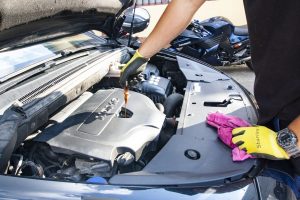While living a busy life, it might be tempting to ignore that little sticker in the corner of your windshield reminding you when to get your next Hyundai oil change. But that would be very unwise. As old motor oil begins to turn to sludge, it can rapidly lead to a blown gasket, engine failure, and a voided vehicle warranty. Let’s look at how often to change your oil and three signs that you need an oil change soon.
Conventional Oil vs Synthetic Oil

The majority of older Hyundai’s still take conventional oil, which should be changed every 3,000 to 5,000 miles. Many newer Hyundai models, on the other hand, take synthetic oil, which only needs to be changed every 7,500 to 10,000 miles.
Recommended oil change intervals vary by model and year, so check your owner’s manual for the exact type of oil you should be using and how often to change it. The popular 2022 Hyundai Tucson SUV, for example, takes SAE 0W-20 synthetic engine oil, which should be changed every 7,500 to 10,000 miles.
Normal vs Severe Driving Conditions
Some driving conditions put far more pressure on your engine than usual, resulting in motor oil breaking down faster. These severe conditions include carrying heavy loads, towing a trailer, continual stop-and-go traffic, constant short trips of under five miles, and extremely hot, cold, or dusty climates.
If you’re habitually driving in any of these conditions, you’ll need to have your oil changed more often. If you’re unsure whether your driving conditions qualify as severe, you can always ask at your local dealership.
Keep Your Warranty Valid
Hyundai drivers rarely need to use their warranty because Hyundai vehicles are so durable and reliable. Despite this, it’s always better to be safe than sorry. So keep your vehicle warranty valid by checking the oil change intervals it specifies and sticking to that schedule.
Signs of Engine Trouble From Aging Oil
If you ever notice the following signs of engine problems, have a technician refresh your oil right away. Any delay might result in expensive or even irreparable engine damage.
Overheating Engine
When your oil stops lubricating the engine properly, friction increases between the moving mechanical parts. This swiftly leads to overheating. When this happens, the temperature gauge on your dashboard will shoot up. You’ll also hear ticking sounds and your hood will become hot to touch.
Knocking, Rumbling Noises
Lubrication keeps an engine quiet. With insufficient oil, your engine might become very noisy. Any knocking or rumbling sounds indicate that the parts inside are brushing against each other without proper lubrication, which will rapidly lead to serious damage if left unattended.
Blinking “Check Engine” Light
The “check engine” light on your dashboard should never be ignored. It might be indicating something as easy to fix as a clogged-up air filter. Or it might be warning you of imminent catastrophic engine damage due to inadequate oil.
To have your oil checked and changed today by certified technicians, visit Coughlin Hyundai of Heath. We’re an award-winning local dealership with friendly, experienced staff dedicated to providing exceptional customer service to everyone who steps foot through our doors.
Image via Pixabay





